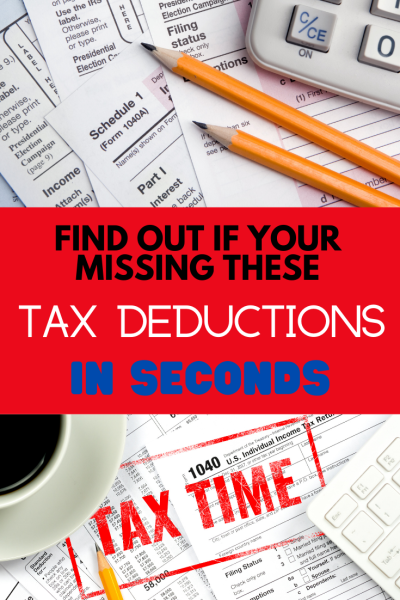
Tax season is right around the corner, and all Americans are hoping they will not owe Uncle Sam this year. They are actually hoping to get something back in the form of a healthy tax refund. I know that most of us want to keep our money in our own wallets, not Uncle Sam’s.
Therefore, I have written this post to help you file your tax return with as little stress as possible and how to take advantage of every tax deduction, whether as a standard deduction or use itemized deductions, that is available to you. I have even included a couple of tax credits you may be able to use.
Standard Deduction v. Itemized Deductions
Whether you complete a tax return on your own or use an accountant to file your taxes for you, there are many things that taxpayers should be aware of to get a maximum return on their income taxes. The first decision a taxpayer should make is if they will use the standard deduction for the year or if they will use itemized deductions.
Taxpayers should think about this at the start of the tax year because you will need to keep files on sales receipts, tax credits (including child tax credits), mortgage interest, health savings accounts, charitable donations, IRA contributions (whether Roth IRA or Traditional IRA), home office deductions, capital gains, and other opportunities to lower the tax rate.
Standard Tax Deductions
What does that actually mean? How do I know if I should file a standard deduction?
The IRS lets you take the standard deduction on a no-questions-asked basis. The standard deduction reduces the amount of gross income you have to pay taxes on. The standard deduction is a specific dollar amount that reduces your taxable income. For the 2021 tax year, the standard deduction is $12,550 for single filers and married filing separately $25,100 for joint filers and $18,800 for the head of household.
If your standard deduction is less than your itemized deductions, you probably should itemize and save money.
Itemized Tax Deductions
According to the IRS, you should consider itemizing your deductions if your allowable itemized deductions are greater than your standard deduction or if you must itemize deductions because you can’t use the standard deduction.
Itemized deductions include amounts you paid for state and local income or sales taxes, real estate taxes, personal property taxes, mortgage interest, and disaster losses. You may also include gifts to charity and part of the amount you paid for dental and medical expenses. See the Instructions for Schedule A (Form 1040) to determine what exclusions may apply when itemizing your tax deductions.
One note of point regarding standard versus itemized deductions – you may choose to use the standard deduction to save time on filing even if you qualify for itemizations.
You can learn more about the standard deductions and itemized deductions by visiting the IRS website or Nerd Wallet.
Most Overlooked Tax Deductions
Once you have decided to use the itemized tax deductions, you need to be aware of what qualifies as a tax deduction.
Check out these most overlooked tax deductions. You will want to keep these deductions in mind whenever tax season hits so that you keep your money instead of paying Uncle Sam. There are various resources for knowing what qualifies as an itemized deduction, from the IRS to Turbo Tax.
- State Sales Tax – For those taxpayers living in Alaska, Florida, Nevada, New Hampshire, South Dakota, Tennessee, Texas, Washington, and Wyoming, you do not pay a state income tax (Lucky!). Therefore, it may benefit you to itemize any sales taxes you paid during the year. Why is this important? Because you must choose between deducting state and local income taxes or state and local sales taxes. You cannot file both. For most citizens of income-taxing states, the state and local income tax deduction is usually the better deal.
- Student Loan Interest – Those pesky student loans can go away for just a second as you bask in the gloriousness of getting some rate of return on them. Student loans have outrageous interest rates, so it’s nice to get that student loan tax deduction at the end of the year. Keep in mind that a student who’s not claimed as a dependent can qualify to deduct up to $2,500 of student loan interest paid by the student or a parent.
- Charitable Donations (Out-of-Pocket) – Do not overlook the charitable donations that you made throughout the year because all those little donations do add up and you can deduct out-of-pocket costs you incur while being a good citizen. Turbo Tax provides a good article on how to deduct all those charitable donations. If you drove your car for a charity during the year, you can also deduct $0.14 per mile. Also, keep track of those cash donations by getting a receipt.
- Moving Expenses (Military Personnel) – Active military personnel may still claim moving expenses as long as the government has not reimbursed said personnel for these costs. Also, if the move was ordered by the military and considered permanent, military personnel do not have to pay tax on qualified moving expense reimbursements. This is great news for our military personnel who are serving this great country. Start saving those receipts now so you can claim travel and lodging expenses for you and your family and the cost of moving your belongings and cars. You can even deduct the cost of moving your beloved fur babies!
- Other Military Travel Expenses– Here is a bit of more good news for military personnel! Travel expenses and lodging costs for drills and meetings may also be deductible. Be sure to research what exactly qualifies as a deduction as the tax laws change year to year.
- Child Care and Dependent Care Tax Credit – This is a tax credit, not a deduction, which is better for you the taxpayer. If you’re a parent that has sent your child to daycare this year, keep in mind that you’re eligible for a tax deduction. You will want to make sure your caregiver is aware you will be turning their information in as you do your taxes, this way they’re not surprised in any way, shape, or form. Turbo Tax has another good article explaining the Ins and Outs of The Child Care and Dependent Care Tax Credit.
- Being a Caregiver – Not many people know about this tax deduction. However, being a caregiver may qualify you to receive a tax reduction as they are your dependent whenever you’re caring for them. You can typically deduct the cost of caring for them for things like in-home care.
- American Rescue Plan (Signed into Law on March 11, 2021) – This plan brought about big changes for 2021. This new law brought about significant changes to the way and amount that the taxpayer can claim the child and dependent care expenses for the tax year 2021. The plan increases the credit and the number of taxpayers that will benefit from the credit’s highest rate. It also makes it fully refundable!
- PayPal Fees– If you are a professional or small business owner that uses PayPal on a daily basis, you know the sting of the fees associated with it. You can easily deduct this as a business expense. While you will not get the full amount back, you may still receive a nice chunk of a tax deduction.
- Earned Income Tax Credit (EITC) – Here is another tax credit. According to the IRS, many taxpayers fail to file their EITC each year. The EITC was established to supplement wages for low to moderate-income employees. Turbo Tax provides an article discussing the 5 Facts About the Earned Income Tax Credit.
- Refinancing Mortgage Points – Many Americans may not be aware of this tax deduction. When you buy a house, you are eligible to deduct points paid to obtain your mortgage all at one time. However, when you refinance your mortgage, you have to deduct the points over the life of the loan. How much is that worth to you? It is worth $33.00 per $1,000 worth of points you paid. Also, when you pay off that mortgage, you get to deduct all the points not yet deducted.
- Miscellaneous Expenses- Most people ignore this tax deduction because they get too nervous to use it. It can be hard to know what qualifies as “miscellaneous” in terms of the government. A good example of this type of deduction would be deducting costs associated with transportation expenses while job hunting. Sometimes you can deduct miles that you’ve put on your vehicle due to a job. Always check with a professional to make sure you qualify for specific miscellaneous expenses.
- Personal Property Taxes– If you have paid property taxes this year, you may be eligible for a tax deduction.
In addition to the above list, don’t forget about any personal retirement plans that you may have, such as an Independent Retirement Account or IRA. You can visit the IRS website to learn more about IRA tax deductions in their article Topic No. 451 Individual Retirement Arrangements (IRAs).
Also, if you own a small business or you are self-employed, the IRS has information regarding tax cuts that you can take each year.
Keep in mind that taxes are not the same for everyone. What you may qualify for, someone else may not. Keep these tax deductions in mind whenever it’s time to file.
Do you have any overlooked tax deductions to add to the list? Please let me know.
Thank you for visiting Blessed Beyond a Doubt and pinning this post for others to benefit from this information.














Eyeglasses/contacts is a prescription. What you pay out of pocket u can put towards your taxes. You can do this for any prescription! All you have to do is ask your doctor/pharmacy to print out your history for the past year. Woolla you give it to your tax person. Super easy!!!
Thanks for the added suggestion!